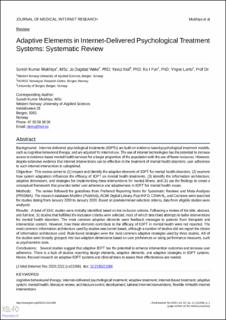Adaptive Elements in Internet-Delivered Psychological Treatment Systems: Systematic Review
Peer reviewed, Journal article
Published version

View/
Date
2020Metadata
Show full item recordCollections
Original version
Mukhiya, S. K., Wake, J. D., Inal, Y., Pun, K. I., & Lamo, Y. (2020). Adaptive elements in internet-delivered psychological treatment systems: Systematic review. Journal of Medical Internet Research, 22(11) 10.2196/21066Abstract
Background: Internet-delivered psychological treatments (IDPTs) are built on evidence-based psychological treatment models, such as cognitive behavioral therapy, and are adjusted for internet use. The use of internet technologies has the potential to increase access to evidence-based mental health services for a larger proportion of the population with the use of fewer resources. However, despite extensive evidence that internet interventions can be effective in the treatment of mental health disorders, user adherence to such internet intervention is suboptimal. Objective: This review aimed to (1) inspect and identify the adaptive elements of IDPT for mental health disorders, (2) examine how system adaptation influences the efficacy of IDPT on mental health treatments, (3) identify the information architecture, adaptive dimensions, and strategies for implementing these interventions for mental illness, and (4) use the findings to create a conceptual framework that provides better user adherence and adaptiveness in IDPT for mental health issues. Methods: The review followed the guidelines from Preferred Reporting Items for Systematic Reviews and Meta-Analyses (PRISMA). The research databases Medline (PubMed), ACM Digital Library, PsycINFO, CINAHL, and Cochrane were searched for studies dating from January 2000 to January 2020. Based on predetermined selection criteria, data from eligible studies were analyzed. Results: A total of 3341 studies were initially identified based on the inclusion criteria. Following a review of the title, abstract, and full text, 31 studies that fulfilled the inclusion criteria were selected, most of which described attempts to tailor interventions for mental health disorders. The most common adaptive elements were feedback messages to patients from therapists and intervention content. However, how these elements contribute to the efficacy of IDPT in mental health were not reported. The most common information architecture used by studies was tunnel-based, although a number of studies did not report the choice of information architecture used. Rule-based strategies were the most common adaptive strategies used by these studies. All of the studies were broadly grouped into two adaptive dimensions based on user preferences or using performance measures, such as psychometric tests. Conclusions: Several studies suggest that adaptive IDPT has the potential to enhance intervention outcomes and increase user adherence. There is a lack of studies reporting design elements, adaptive elements, and adaptive strategies in IDPT systems. Hence, focused research on adaptive IDPT systems and clinical trials to assess their effectiveness are needed.
Publisher
JMIR PublicationsJournal
Journal of Medical Internet ResearchCopyright
©Suresh Kumar Mukhiya, Jo Dugstad Wake, Yavuz Inal, Ka I Pun, Yngve LamoRelated items
Showing items related by title, author, creator and subject.
-
Adaptive Systems for Internet-Delivered Psychological Treatments
Mukhiya, Suresh Kumar; Wake, Jo Dugstad; Inal, Yavuz; Lamo, Yngve (Peer reviewed; Journal article, 2020)Internet-Delivered Psychological Treatments (IDPT) are based on evidence-based psychological treatment models adjusted for interaction through the Internet. The use of Internet technologies has the potential to increase ... -
En mislykket innovasjonsprosess: En kvalitativ casestudie av Eviny Digital sin satsing på Internet of Things
Halvorsen, Ane Anu Sælen; Tonning, Susann Wettergreen (Master thesis, 2023)Eviny Digital AS, datterselskap av Eviny AS, utvidet porteføljen deres i 2019 ved å satse på Internet of Things. De skulle bli et kompetansesenter for IoT, men innovasjonsprosessen ble lagt ned av konsernledelsen i 2022. ... -
An edge-aided parallel evolutionary privacy-preserving algorithm for Internet of Things
Telikani, Akbar; Shahbahrami, Asadollah; Shen, Jun; Gaydadjiev, Georgi; Lin, Jerry Chun-Wei (Peer reviewed; Journal article, 2023)Data sanitization in the context of Internet of Things (IoT) privacy refers to the process of permanently and irreversibly hiding all sensitive information from vast amounts of streaming data. Taking into account the dynamic ...
